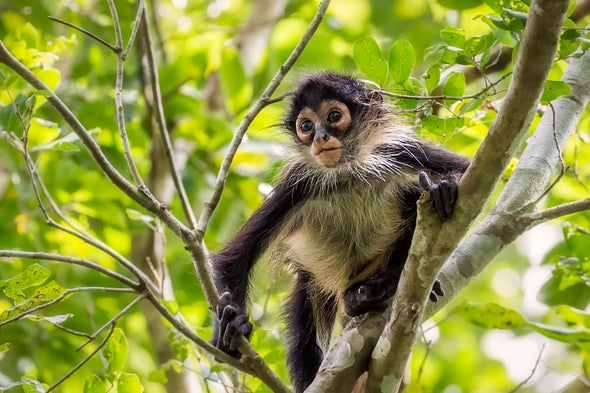(单词翻译:单击)
听力文本
This is Scientific American's 60-second Science, I'm Christopher Intagliata.
The hardest part of chasing monkeys through the jungle isn't the snakes. "The snakes aren't going to attack you if you don't have contact with them." It's simply keeping up with the monkeys. "They are jumping from one tree to another tree so they don't care if the landscape is difficult or if there is a river."
José Domingo Ordóñez-Gómez. He's a primatologist at the German Primate Center in Göttingen. The reason he was pursuing 35 spider monkeys through the rainforests of southern Mexico was to record their whinnies.

By analyzing more than 500 calls, he found that when a monkey was separated from the group by more than 40 meters—or 130 feet—it produced a lower-pitched call than when the same monkey was nearby the group. Ordó?ez-Gómez thinks the pitch choice may be because lower-frequency calls are better suited to travel long distances through dense jungle.
The findings are in the journal PLOS One.
Ordóñez-Gómez also found that other spider monkeys responded back more quickly when they heard one of the low-pitched calls, compared to regular whinnies—perhaps, he says, because the deeper calls really get the attention of eavesdropping monkeys. It's a relatable feeling for any human primate who's heard a crying baby.
Thanks for listening for Scientific American — 60-Second Science. I'm Christopher Intagliata.
参考译文
这里是科学美国人——60秒科学系列,我是克里斯托弗·因塔格里塔。
在丛林里追猴子的最难之处,并不是会遇到蛇。“如果你不接触蛇,它们就不会攻击你。”最难的是跟上猴子。“它们从一棵树跳到另一棵树,所以它们并不关心周围的环境是否艰险,也不在乎是否有河流。”
何塞·多明戈·奥德内兹-戈麦斯说到。他是位于哥廷根的德国灵长目中心的灵长目动物学家。他穿越墨西哥南部的雨林追寻35只蜘蛛猴,目的是记录它们的叫声。
在分析500多个叫声之后,他发现当一只蜘蛛猴与族群相隔40多米(130英尺)时,它发出的叫声比其在族群附近时要低。奥德内兹-戈麦斯认为,这种音调选择,可能是因为低频叫声更适合在茂密的丛林里长距离传播。
研究结果发表在《公共科学图书馆·综合》期刊上。
奥德内兹-戈麦斯还发现,与听到普通叫声相比,其它蜘蛛猴在听到其中一种低沉的叫声时,会做出更快的反应,他认为,这或许是因为偷听的猴子更留意低沉的叫声。任何人类灵长类动物在听到婴儿的哭声时都会有同感。
谢谢大家收听科学美国人——60秒科学。我是克里斯托弗·因塔利亚塔。
译文为可可英语翻译,未经授权请勿转载!
重点讲解
重点讲解:
1. keep up with (与…)齐步前进;不落后(于…);
She shook her head and started to walk on. He kept up with her.
她摇了摇头开始往前走。他跟了上去。
2. separte from 隔开;阻隔;使分开;
They became separated from their party.
他们和伙伴们分开了。
3. be suited to 合适的;适宜的;适当的;
The area is well suited to road cycling as well as off-road riding.
这个地方很适合举行自行车公路赛和越野赛。
4. compared to 与…相比;和…比起来;
His progress at school had been unspectacular compared to his brother.
和弟弟相比,他在学校里的进步很不起眼。


